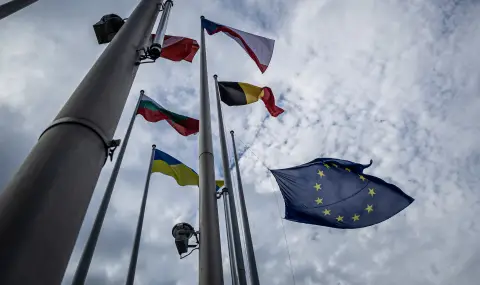European Union leaders agreed on Thursday to use all their levers, including trade, development aid and visa policy, to speed up the return of migrants entering the bloc illegally, and asked the European Commission to urgently draft a law, reports "Reuters", quoted by News.bg.
Immigration is a highly sensitive topic in most of the bloc's 27 member states, although illegal migrants arriving in Europe last year were a third of the 1 million seen during the 2015 crisis, and the number they decreased even more this year.
Leaks at the EU's external borders are destroying the Schengen area for passport-free travel, fueling the rise of far-right parties and influencing election results across Europe, making migration a key political issue.
"The European Council calls for decisive action at all levels to facilitate, increase and speed up returns from the European Union, using all relevant EU instruments and policies, including diplomacy, development, trade and visas," said the leaders in the written conclusions of their meeting.
Of the 484,000 non-EU nationals ordered to leave the EU last year, only 20% returned home. European Commission President Ursula von der Leyen said the Commission is working to improve this number and will soon present a law to tackle it.
Leaders also backed Poland in its plan to temporarily suspend asylum applications from migrants pushed across the country's eastern border from Belarus and Russia.
While many NGOs say the decision to reject asylum applications is a breach of the EU's Charter of Fundamental Rights, von der Leyen said it was legal as a temporary response to a hybrid attack from Minsk and Moscow.
"Russia and Belarus... cannot be allowed to abuse our values, including the right to asylum, and undermine our democracies," EU leaders said in the conclusions. "The European Council expresses solidarity with Poland... Emergency situations require appropriate measures."
In July, Finland, which has faced a similar challenge from migrants pushed across its border with Russia, also stopped accepting asylum applications.
EU leaders also discussed the creation of "return centers" in non-EU countries, where migrants whose EU asylum applications have been refused can await deportation to their home country, provided it is safe to return them there.
Von der Leyen said the discussion on how to organize such centers is still ongoing, to establish which third country can be considered safe, how long a migrant can be held in a center and what does if returning to the homeland is not possible.
Italy's right-wing government has already created such a "return center" in Albania, and the conservative Dutch government is considering sending rejected African asylum seekers to Uganda.
Not all leaders were enthusiastic about the idea.
German Chancellor Olaf Scholz said that for a country as large as Germany, asylum processing centers outside the bloc would only be able to process a small proportion of applications and that a fast-track return law would be more helpful.
Scholz and other leaders also stressed that the EU is in dire need of migrants as the EU's population ages and cost-effective pension systems come under increasing pressure.
Spain's Socialist Prime Minister Pedro Sánchez said migration is a positive phenomenon and something Spain and other European economies desperately need.
"Do we want a prosperous and therefore open Europe, or do we want a poor and therefore closed Europe?" Sanchez said. "We must deal with the phenomenon of migration with future generations in mind, not the next election."
Outsourced migrant centers are not a bad idea. We have an improved example with Italy and Albania. Exporting such centers to third countries is a good example that we will support, Acting Prime Minister Dimitar Glavchev told journalists in Brussels.
The Prime Minister also said that the subject of the outsourced migrant centers will still be discussed by the leaders of the European countries.
He emphasized that Bulgaria has not started such negotiations with third countries. According to him, the best option is to have a dialogue with Turkey, where the migrant flow comes from. According to Glavchev, at the moment our cooperation with the Turkish authorities for the protection of the border is very good.
